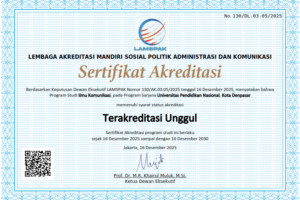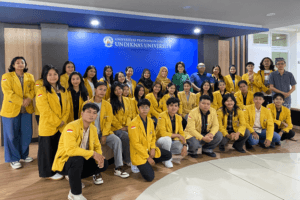
Environmental Engineering Team of Universitas Pendidikan Nasional Holds Social Service through Waste Sorting Education in Renon-Denpasar
Denpasar – The issue of waste in Indonesia, especially in large cities like Denpasar, has become a crucial matter affecting environmental health and the quality of life of the community. Many people still do not understand the importance of sorting waste from home, resulting in mixed organic and inorganic waste that is difficult to process. Universitas Pendidikan Nasional, through its Environmental Engineering Team, initiated a social service event to educate the public on the proper management of waste and support efforts to maintain the cleanliness of Denpasar city (May 19, 2024).
The agenda of this event included educational sessions on the importance of waste sorting, categorizing waste based on its type, and the positive impacts that can be achieved through community commitment to addressing the waste problem, which is currently very critical. Through this education, the public is encouraged to be more aware and responsible in waste management, with the hope of creating a cleaner and healthier environment.
The social service activity conducted by the Environmental Engineering Team of Universitas Pendidikan Nasional aligns with the Sustainable Development Goals (SDGs) established by the United Nations (UN), particularly:
Goal 11: Sustainable Cities and Communities, which aims to make cities and human settlements inclusive, safe, resilient, and sustainable. The waste sorting education provided by the Environmental Engineering Team of Universitas Pendidikan Nasional aims to reduce the volume of unmanaged waste, thus helping to create a cleaner and more environmentally friendly city. Effective waste sorting also contributes to reducing pollution and improving the quality of life in urban areas.
Goal 12: Responsible Consumption and Production, which emphasizes the importance of ensuring sustainable consumption and production patterns. Education on waste sorting is an essential first step in managing waste more responsibly. By separating organic and inorganic waste, the community can more easily recycle and process waste, ultimately reducing the negative environmental impacts and optimizing the use of natural resources.
In addition to that, this activity also collaborates with the Civil Engineering, IT, and Electrical Engineering programs through a demonstration of a faculty research outcome, namely an object detection device expected to be useful in detecting and categorizing objects according to programmed categories. This device also utilizes programming systems and AI features to achieve accurate results, thereby expected to facilitate its usage in society.
Through this initiative, Universitas Pendidikan Nasional demonstrates its commitment to sustainable development and the improvement of community welfare. It is hoped that educational activities like this can continue to be carried out regularly to provide broader and more sustainable benefits for the people of Denpasar.



